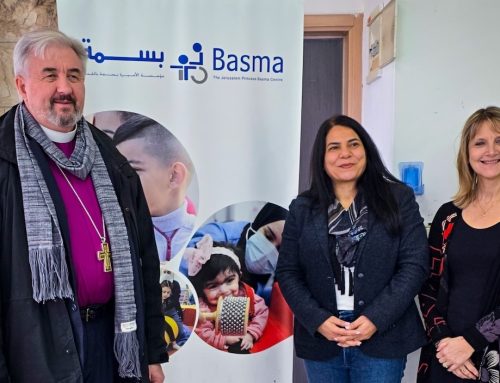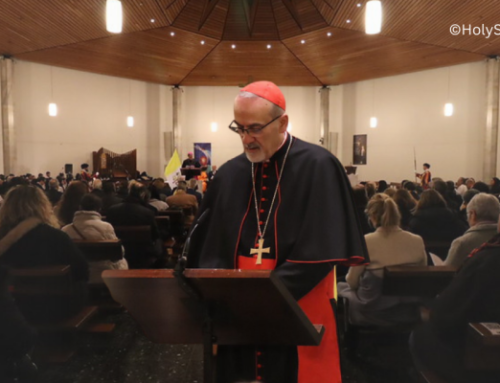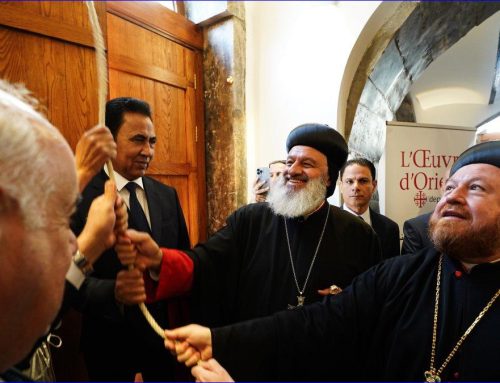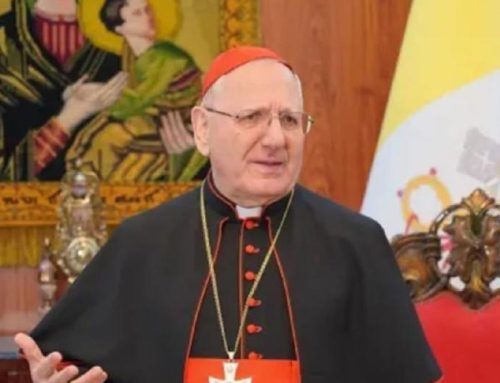The Evangelical Lutheran Church in America (ELCA) has something vital to say about Christian Zionism, said the Rev. Robert O. Smith, director, Europe/Middle East Continental Desk, ELCA Global Mission. Smith spoke March 8 to the ELCA Conference of Bishops.
The Evangelical Lutheran Church in America (ELCA) has something vital to say about Christian Zionism, said the Rev. Robert O. Smith, director, Europe/Middle East Continental Desk, ELCA Global Mission. Smith spoke March 8 to the ELCA Conference of Bishops.
The Conference of Bishops is an advisory body of the church, consisting of the ELCA’s 65 synod bishops, presiding bishop and secretary. The conference met here March 6-11.
Smith’s presentation was part of the conference’s preparation for a 2009 visit to Israel and the West Bank. The bishops’ Middle East visit is part of the ELCA’s "Strategy for Engagement of Israel and Palestine," which calls for learning about the situation there, building relationships and advocating for a just peace in the region.
Christian Zionism is a "politically mobilized strand of Christian fundamentalism" committed to preserving Jewish control over all of historic Palestine, Smith said. The movement places the State of Israel, and often the United States, "at the center of God’s purposes for the end of the age," he told the bishops.
Biblical references in the books of Joel and Genesis are used to justify the movement’s claims, Smith said.
Christian Zionism "anticipates the destruction of all persons not adhering to its ideology," Smith said. "It is not a vision of hope. It is a vision of injustice."
Smith argued that Christian Zionism is dehumanizing to Palestinians and Jews. He also reminded the conference that a 2007 ELCA Churchwide Assembly action called for increased engagement with conservative Christians, and a clearer and more forceful expression of Lutheran theology in the public debate on such matters.
When the ELCA engages Jewish-Christian relations, the Israeli-Palestinian conflict and Christian Zionism, "we must remember our call to a ministry of reconciliation — one that fosters reconciliation between neighbors whom we are called to serve and love," Smith said.
"We are not called to be political pundits just to argue one point to win the point. That is not our call. Instead, we are called to be peace builders, and that means the task to which we are called is far more difficult. We are called to engage our friends on all sides of this conflict, and there are more than two sides to this conflict."
Lutherans must speak to Christian Zionism in an authentic, distinctive way but not in a "triumphalistic" way, Smith said.
In January 2009 conference members, accompanied by some staff, will visit the Middle East for their annual academy. A few synod bishops and the presiding bishop will begin Jan. 3-5 with a visit Jordan. They will be joined by other conference members Jan. 5-14 for visits to Israeli and Palestinian government officials, and Middle East church leaders, as well as support for the leaders and members of the Evangelical Lutheran Church in Jordan and the Holy Land.
The conference also heard about and discussed other matters:
+ Christina Jackson-Skelton, ELCA treasurer, reported that 2007 was a year of positive financial results for the churchwide organization. Current operating revenue was $83.3 million, up $300,000 from 2006, she wrote in her report. Expenses were up $1.2 million to $80.8 million for 2007. Mission support funds from congregations through synods were $66.1 million, up $500,000 from 2006, the second consecutive year mission-support funds increased, Jackson-Skelton wrote. Total operating income was up for the fourth consecutive year, she reported, adding that contributions to the general ELCA World Hunger Appeal for 2007 were $21.3 million, a new high.
+ The Rev. Mark S. Hanson, ELCA presiding bishop, said he hoped that the ELCA won’t be silent about immigration, as the presidential candidates seem to be. "We have wonderful statements on immigration, and they need to frame our conversation and our contribution," he said.
Hanson also said the ELCA’s expression of regret for statements about Anabaptists has had "a profound impact on the Mennonite community as a gesture of repentance" that has opened conversations between the ELCA and the Mennonites. In 2006 the ELCA Church Council rejected past statements attributed to early Lutheran church reformers and expressed "its deep and abiding sorrow and regret for the persecution and suffering visited upon the Anabaptists during the religious disputes of the past."
+ A new ELCA Web site will be online April 28, said Kristi S. Bangert, executive director, ELCA Communication Services. The current ELCA Web site logs about 36,000 individual visits per day and 192,000 page views per day, she said.
+ Fourteen regional conferences are planned to discuss care for military personnel returning from Afghanistan and Iraq, said the Rev. Darrell D. Morton, assistant to the ELCA presiding bishop for federal chaplaincy ministries. He said there are 82 active-duty military chaplains, compared to about 115 four years ago. Morton attributed the drop in chaplains to retirements, adding that "the need is no less, and we need these young pastors."
+ Augsburg Fortress, the Minneapolis-based ELCA publishing ministry, posted a $2.5 million profit for 2007, said Beth A. Lewis, president and chief executive officer. A significant factor is sales of Evangelical Lutheran Worship, an ELCA worship resource introduced in 2006. About 960,000 copies of the pew edition have been sold, she said. The publisher is planning to put income for 2006 and 2007 into the publishing ministry, Lewis said.
+ Testing will begin soon for an ELCA Mobility Database Project, said the Rev. Stanley J. Meyer, project director. Meyer, who serves as assistant to the bishop, ELCA Northern Texas- Northern Louisiana Synod, Dallas, said the online database will be a tool and resource that synods can use as they pursue their call-process work. Forms and a Web site are expected to be approved and functional by November 2008, he said.





